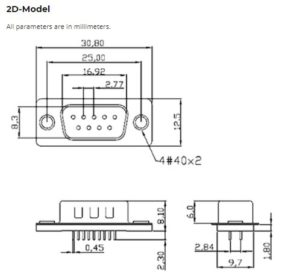A RS232 connector is a port used for data exchange between equipments. It was designed for data exchange between DTE (Data Terminal Equipment) or PC and DCE (Data Communication Equipment) or MODEM. The need for RS232 came from limitations raised by parallel data exchange. RS232 uses serial communication protocol where data exchange is done bit by bit. Although RS232 is later replaced by faster USB (Universal Serial Bus) it is still popular in some areas. RS232 used to have 25 pin, now it is shrunk to just 9 pin.

RS232 Pin Configuration
New RS232 has nine pins as mentioned earlier. These nine pins are arranged in the port as shown in RS232 Connector Pinout. The DCE and DTE ports are exactly similar except for the direction of data flow. These nine pins are roughly divided in to three categories and we will discuss each category below.
|
Pin Number |
Pin Name |
Description |
|
DATA pins (Data flow takes through these pins) |
||
|
2 |
RXD |
Receive Data (Data is received though this pin) |
|
3 |
TXD |
Transmit Data (Data is transmitted through this pin) |
|
CONTROL pins (These pins are for establishing interface and to avoid data loss) |
||
|
1 |
CD |
Carrier Detect(Set by MODEM when answer is received by remote MODEM ) |
|
4 |
DTR |
Data Terminal Ready(Set by PC to prepare MODEM to be connected to telephone circuit) |
|
6 |
DSR |
Data Set Ready(Set by MODEM to tell PC it is ready to receive and send data) |
|
7 |
RTS |
Request To Send(Set by PC to tell MODEM that MODEM can begin sending data) |
|
8 |
CTS |
Clear To send(Set by MODEM to tell PC that it is ready to receive data) |
|
9 |
RI |
Set by MODEM to tell PC a ringing condition has been detected. |
|
REFERENCE |
||
|
5 |
GND |
Ground (Used as reference for all pin voltage pulses) |
RS232 Features and Specifications
- RS232 uses Asynchronous communication so no clock is shared between PC and MODEM.
- Logic ‘1’ on pin is stated by voltage of range ‘-15V to -3V’ and Logic ‘0’ on pin is stated by voltage of range ‘+3V to +15V’. The logic has wide voltage range giving convenience for user.
- MAX232 IC can be installed easily to establish RS232 interface with microcontrollers.
- Full duplex interface of RS232 is very convenient.
- Two pin simplex RS232 interface can also be established easily if required.
- A maximum data transfer speed of 19 Kbps(Kilobits per second) is possible through RS232
- A maximum current of 500mA can be drawn from pins of RS232
- The interface can be established up to a distance of 50 feet.
Disadvantages of RS232
- There is no pin dedicated for powering devices (No VCC)
- More communication pins
- Switching voltages between +15v and -15v is difficult at higher speeds
- A maximum speed of 19 Kbps
- A maximum distance of 50 feet
- More pins lead to higher noise
- Only a single device can be connected to RS232 connector unlike I2C
- Need hardware to convert high voltage logic of RS232 to be compatible to TTL (controller and processor units)
Where RS232 is Used?
A few examples where RS232 are suitable to use:
1. When you want a simple communication interface between two units. A two pin full duplex communication can be establishes easily on RS232 port.
2. RS232 is used in systems where clock sharing is difficult. RS232 is ASYNCHRONOUS so there will be no clock sharing between systems. All you need to do is set data bit rate for each unit. Once baud rate is set the units will sample the data according to set baud rate.
3. RS232 is also used to control a single unit specifically without delay or errors.
4. RS232 interface also delivers data with more accuracy which is a requirement in some cases.
How to use RS232 connector?
As mentioned before we cannot connect RS232 directly to controller we need MAX232 IC to covert high voltage signals to TTL and vice versa. A typical circuit for it is shown below.

In here we are connecting controller to female RS232 through MAX232 converter chip. The communication voltages reach as high as +15V and as low as -15V in RS232. There voltage levels cannot be used in sensitive electronics so we use a mediator that is MAX232.
The chip coverts TTL logic pulses of controller to RS232 voltage level pulses and vice versa. Without this chip you may damage something permanently.

Applications
- Personal Computers
- Modems
- Servers
- Memory devices
- Motor control units
- Printers and Scanners
- Telephone lines
- Used basically where serial data transfer is required